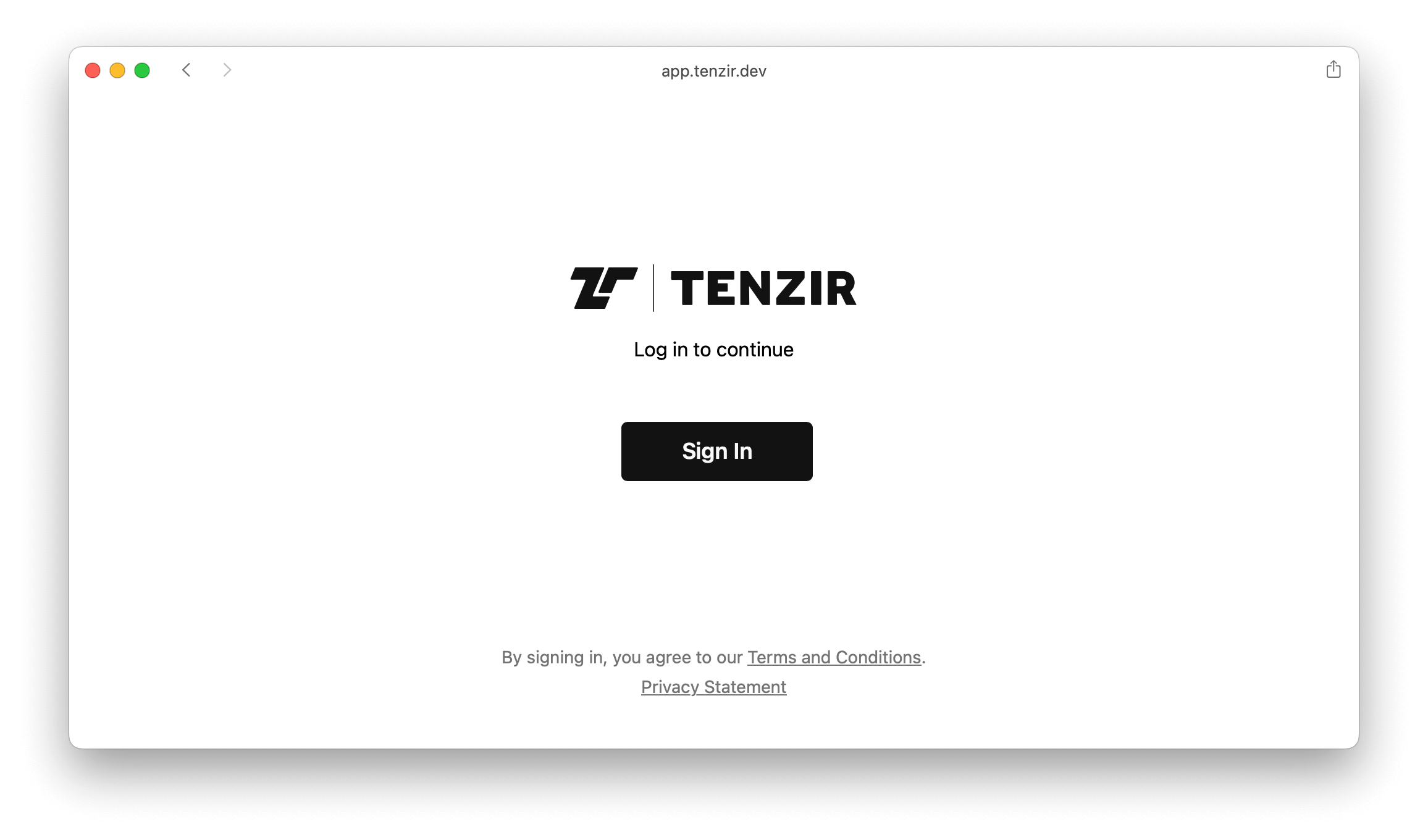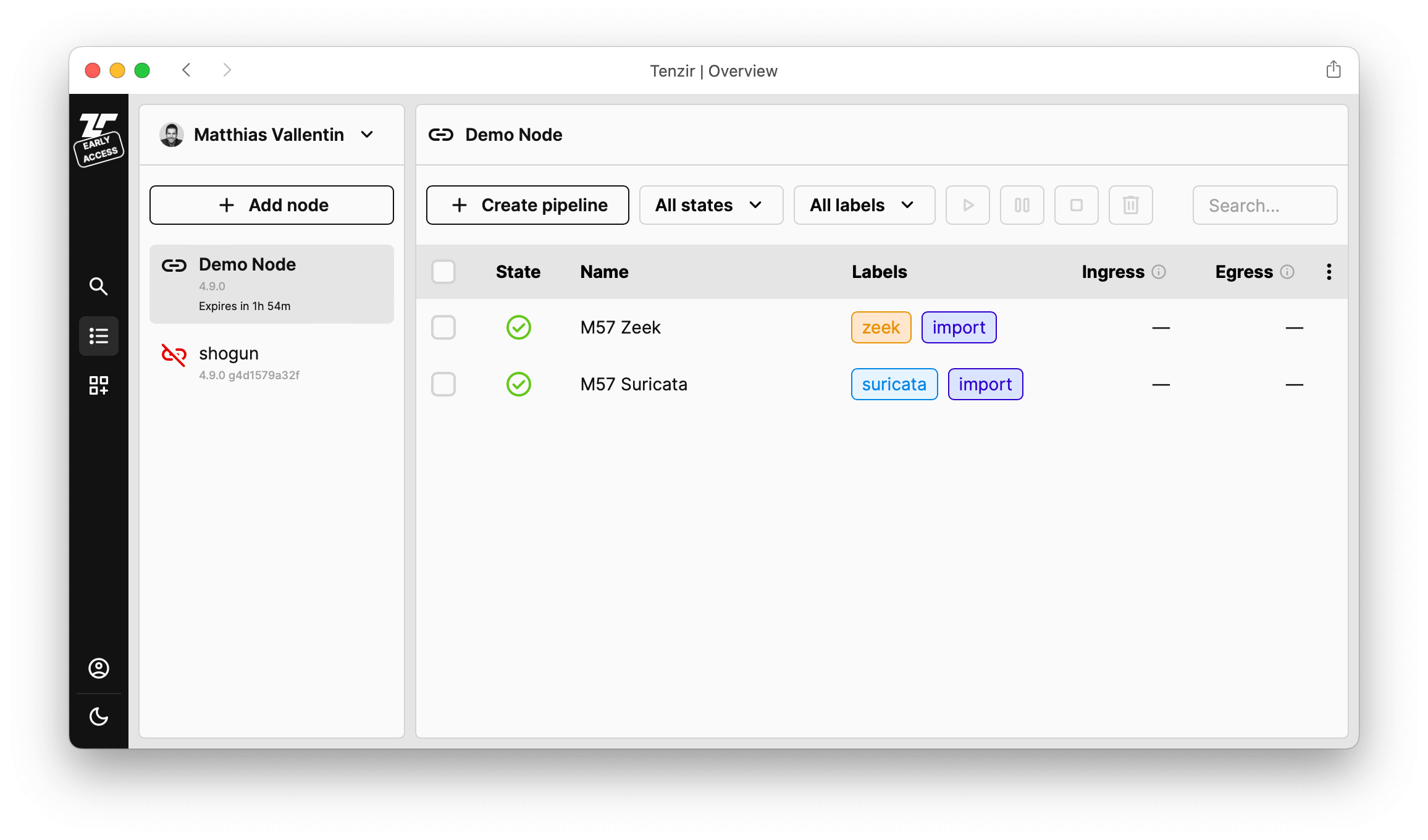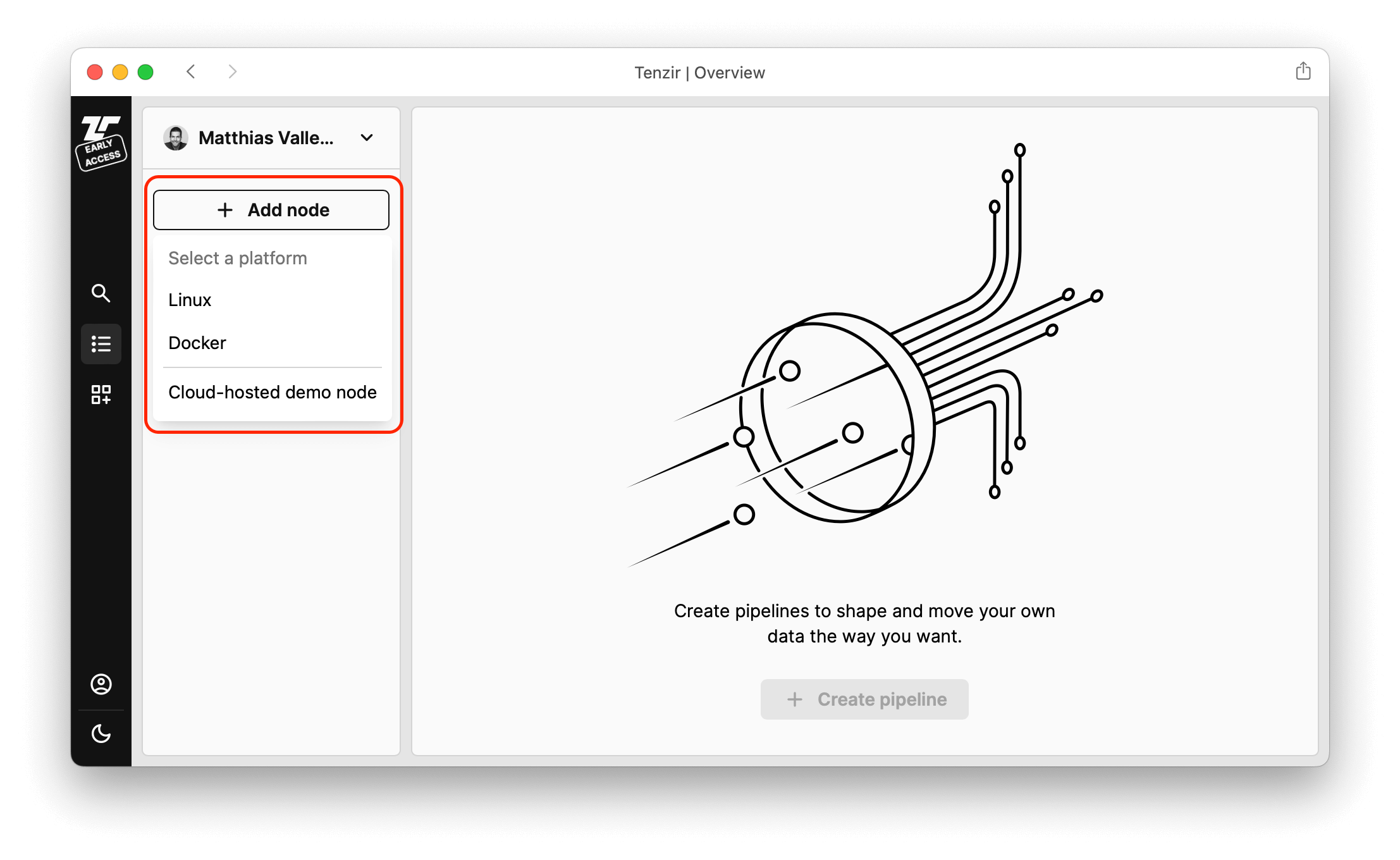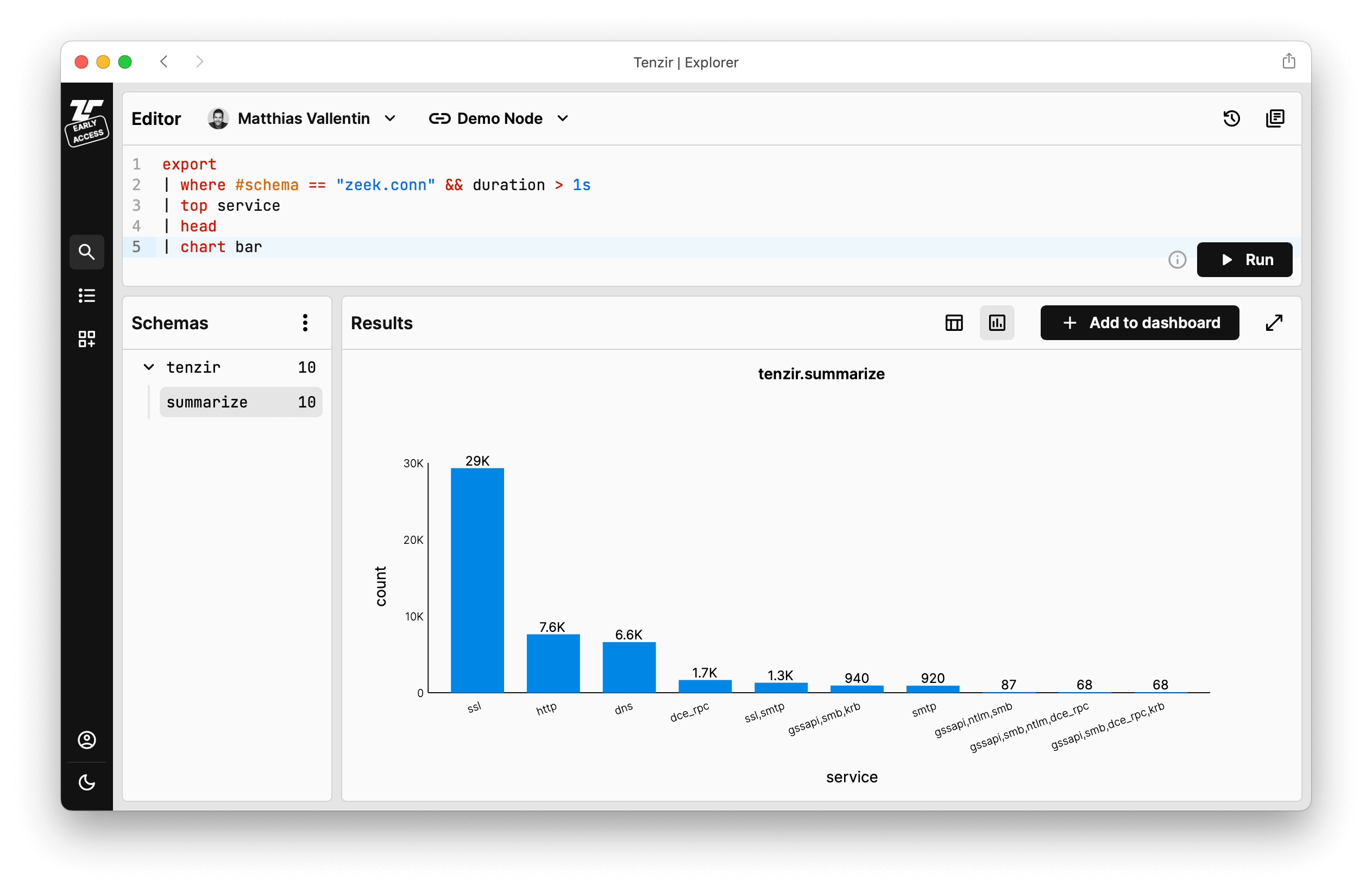Get Started
Tenzir is a data pipeline solution for optimizing cloud and data costs, running detections and analytics, building a centralized security data lake, or creating a decentralized security data fabric.
Explore the demo node
The easiest way to get started is try it out yourself. It takes just a few steps:
- Create a free account by signing in:

- Go to the Overview page:

- Create a demo node by clicking the Add button in the nodes pane and select Cloud-hosted demo node:

Follow the guided tour after the node becomes available (~1 min).
Start learning TQL and explore the data set visually, e.g., to by running aggregations and plotting data:

A quick TQL tour
Let's run a few example pipelines by copying the below examples and pasting them into the Explorer. We pre-loaded the demo node with Zeek and Suricata logs derived from the M57 dataset that we also use in our user guides.
Start with:
export | taste
This pipeline uses export to emit all data
stored at the demo node. We pipe the output to
taste to get a sample of 10 events per
unique schema:
Output
{
"timestamp": "2021-11-18T09:48:16.122571",
"flow_id": 1722746302079096,
"pcap_cnt": 349263,
"vlan": null,
"in_iface": null,
"src_ip": "172.17.2.163",
"src_port": 63342,
"dest_ip": "45.46.53.140",
"dest_port": 2222,
"proto": "TCP",
"event_type": "tls",
"community_id": null,
"tls": {
"sni": null,
"session_resumed": null,
"subject": "C=FR, OU=Seefzjitxo Aolexzn, CN=albfyae.mobi",
"issuerdn": "C=FR, ST=XF, L=Fke, O=Jvohtaneo Znpfkecey Eotel Aorod, CN=albfyae.mobi",
"serial": "0A:F1",
"fingerprint": "6b:0d:bc:a3:ec:fc:4b:56:8a:51:aa:dc:96:b3:e7:35:e6:99:3f:60",
"ja3": {
"hash": "51c64c77e60f3980eea90869b68c58a8",
"string": "771,49196-49195-49200-49199-49188-49187-49192-49191-49162-49161-49172-49171-157-156-61-60-53-47-10,10-11-13-35-23-65281,29-23-24,0"
},
"ja3s": {
"hash": "7c02dbae662670040c7af9bd15fb7e2f",
"string": "771,157,65281-35"
},
"notbefore": "2021-09-23T09:50:44.000000",
"notafter": "2023-09-23T14:57:14.000000",
"version": "TLS 1.2"
},
"metadata": {
"flowints": {
"applayer.anomaly.count": null
},
"flowbits": [
"ET.Evil",
"ET.BotccIP"
]
}
}
{
"timestamp": "2021-11-18T09:32:13.566661",
"flow_id": 1030296579147908,
"pcap_cnt": 342987,
"vlan": null,
"in_iface": null,
"src_ip": "172.17.2.163",
"src_port": 63226,
"dest_ip": "81.214.126.173",
"dest_port": 2222,
"proto": "TCP",
"event_type": "tls",
"community_id": null,
"tls": {
"sni": null,
"session_resumed": null,
"subject": "C=PT, OU=Pejmpse Idtyoor Geiw, CN=myzdef.biz",
"issuerdn": "C=PT, ST=NP, L=Dejxhypqn Tyswmkejf, O=Enfdxjtlz Gucuat LLC., CN=myzdef.biz",
"serial": "25:9F",
"fingerprint": "89:98:69:69:01:8e:e9:a3:e6:ba:17:7a:f5:c6:e1:b8:1b:70:e8:cc",
"ja3": {
"hash": "51c64c77e60f3980eea90869b68c58a8",
"string": "771,49196-49195-49200-49199-49188-49187-49192-49191-49162-49161-49172-49171-157-156-61-60-53-47-10,10-11-13-35-23-65281,29-23-24,0"
},
"ja3s": {
"hash": "7c02dbae662670040c7af9bd15fb7e2f",
"string": "771,157,65281-35"
},
"notbefore": "2021-09-22T17:14:19.000000",
"notafter": "2023-09-23T01:14:49.000000",
"version": "TLS 1.2"
},
"metadata": {
"flowints": {
"applayer.anomaly.count": null
},
"flowbits": null
}
}
(Only first 2 results shown. Output may vary.)
On this site we display the data in JSON. In the Explorer, you can enjoy a
richer display in an interactive table. You can also produce the outputs here by
invoking tenzir <pipeline> on the command line or
docker run -it tenzir/tenzir <pipeline> when using Docker.
The export operator is a source that only produces data, taste is a
transformation that consumes and produces data, and there are sinks that
only consume data. Either you do not provide a sink (like above) and can click
the Run button to see the results in the app, or you provide a sink to deploy
the pipeline continuously.
Now filter the data with where to only
look at Suricata alerts:
export | where #schema == "suricata.alert"
Output
{
"timestamp": "2021-11-17T13:52:05.695469",
"flow_id": 1868285155318879,
"pcap_cnt": 143,
"vlan": null,
"in_iface": null,
"src_ip": "14.1.112.177",
"src_port": 38376,
"dest_ip": "198.71.247.91",
"dest_port": 123,
"proto": "UDP",
"event_type": "alert",
"community_id": null,
"alert": {
"app_proto": null,
"action": "allowed",
"gid": 1,
"signature_id": 2017919,
"rev": 2,
"signature": "ET DOS Possible NTP DDoS Inbound Frequent Un-Authed MON_LIST Requests IMPL 0x03",
"category": "Attempted Denial of Service",
"severity": 2,
"source": {
"ip": null,
"port": null
},
"target": {
"ip": null,
"port": null
},
"metadata": {
"created_at": [
"2014_01_03"
],
"updated_at": [
"2014_01_03"
]
}
},
"flow": {
"pkts_toserver": 2,
"pkts_toclient": 0,
"bytes_toserver": 468,
"bytes_toclient": 0,
"start": "2021-11-17T13:52:05.695391",
"end": null,
"age": null,
"state": null,
"reason": null,
"alerted": null
},
"payload": null,
"payload_printable": null,
"stream": null,
"packet": null,
"packet_info": {
"linktype": null
},
"app_proto": "failed"
}
(Only 1 out of 19 shown.)
The where operator takes an expression as argument,
which combines rich-typed predicates with AND, OR, and NOT. Here's a more
elaborate example:
export
| where 10.10.5.0/25 && (orig_bytes > 1 Mi || duration > 30 min)
Output
{
"ts": "2021-11-19T06:30:30.918301",
"uid": "C9T8pykxdsT7iSrc9",
"id": {
"orig_h": "10.10.5.101",
"orig_p": 50046,
"resp_h": "87.120.8.190",
"resp_p": 9090
},
"proto": "tcp",
"service": null,
"duration": "5.09m",
"orig_bytes": 1394538,
"resp_bytes": 95179,
"conn_state": "S1",
"local_orig": null,
"local_resp": null,
"missed_bytes": 0,
"history": "ShADad",
"orig_pkts": 5046,
"orig_ip_bytes": 1596390,
"resp_pkts": 5095,
"resp_ip_bytes": 298983,
"tunnel_parents": null,
"community_id": "1:UPodR2krvvXUGhc/NEL9kejd7FA=",
"_write_ts": null
}
{
"ts": "2021-11-19T07:05:44.694927",
"uid": "ChnTjeQncxZrb0ZWg",
"id": {
"orig_h": "10.10.5.101",
"orig_p": 50127,
"resp_h": "87.120.8.190",
"resp_p": 9090
},
"proto": "tcp",
"service": null,
"duration": "54.81s",
"orig_bytes": 1550710,
"resp_bytes": 97122,
"conn_state": "S1",
"local_orig": null,
"local_resp": null,
"missed_bytes": 0,
"history": "ShADadww",
"orig_pkts": 5409,
"orig_ip_bytes": 1767082,
"resp_pkts": 5477,
"resp_ip_bytes": 316206,
"tunnel_parents": null,
"community_id": "1:aw0CtkT7YikUZWyqdHwgLhqJXxU=",
"_write_ts": null
}
{
"ts": "2021-11-19T06:30:15.910850",
"uid": "CxuTEOgWv2Z74FCG6",
"id": {
"orig_h": "10.10.5.101",
"orig_p": 50041,
"resp_h": "87.120.8.190",
"resp_p": 9090
},
"proto": "tcp",
"service": null,
"duration": "36.48m",
"orig_bytes": 565,
"resp_bytes": 507,
"conn_state": "S1",
"local_orig": null,
"local_resp": null,
"missed_bytes": 0,
"history": "ShADad",
"orig_pkts": 78,
"orig_ip_bytes": 3697,
"resp_pkts": 77,
"resp_ip_bytes": 3591,
"tunnel_parents": null,
"community_id": "1:r337wYxbKPDv5Vkjoz3gGuld1bs=",
"_write_ts": null
}
The above example extracts connections from the subnet 10.10.5.0/25 that either have sent more than 1 MiB or lasted longer than 30 minutes.
Aside from filtering, you can also perform aggregations with
summarize:
export
| where #schema == "suricata.alert"
| summarize count=count(src_ip) by severity
Output
{
"alert.severity": 1,
"count": 134644
}
{
"alert.severity": 2,
"count": 26780
}
{
"alert.severity": 3,
"count": 179713
}
For counting field values, top and
rare come in handy:
export
| where #schema == "zeek.notice"
| top msg
| head 5
Output
{"msg": "SSL certificate validation failed with (certificate has expired)", "n": 2201}
{"msg": "SSL certificate validation failed with (unable to get local issuer certificate)", "n": 1600}
{"msg": "SSL certificate validation failed with (self signed certificate)", "n": 603}
{"msg": "Detected SMB::FILE_WRITE to admin file share '\\\\10.5.26.4\\C$\\WINDOWS\\h48l10jxplwhq9eowyecjmwg0nxwu72zblns1l3v3c6uu6p6069r4c4c5yjwv_e7.exe'", "n": 339}
{"msg": "SSL certificate validation failed with (certificate is not yet valid)", "n": 324}
This was just a quick tour. The user guides cover a lot more material.
Ready to bring your data to the table? Then continue reading to learn how to deploy your own node.
Up next
Now that you got a first impression of Tenzir pipelines, onboard your own node and dive deeper by
- following the user guides with step-by-step tutorials of common use cases
- learning more about the language, operators, connectors, formats, and the data model
- understanding why we built Tenzir and how it compares to other systems
Don't forget that we're here to help! If you have any questions, swing by our friendly community Discord or open a GitHub discussion.